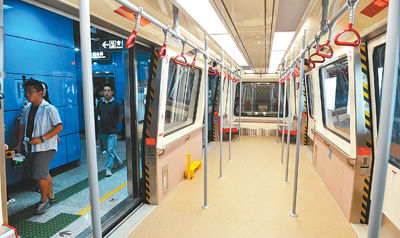First driverless subway line opens
China's first automatic metro line, passing Guangzhou's central business district and the Pearl River, began operating in this provincial capital of Guangdong on Monday.
 |
|
Automated people mover |
The line is dubbed an APM (automated people mover) as all trains running every seven minutes between Chigang Pagoda and Linhexi stations are controlled by a command center instead of drivers.
Emergency and safety equipment inside each carriage enables passengers to contact metro staff if they need assistance.
The stations of Chigang Pagoda and Haixinsha were closed on Monday due to rehearsals of the Asian Games opening ceremony.
The local metro company also said the APM service, which charges 2 yuan (30 cents) for a single trip, will be closed on Nov 12 and 27 due to the opening and closing ceremonies.
As the line passes main office buildings, shopping malls and entertainment venues in Guangzhou, local residents said it will, to some degree, help to ease traffic congestion in the city center.
"The urban center is truly beautiful. It takes at least half an hour to travel from the Linhexi Station to the Guangzhou Tower on foot," said Huang Chunhong, a white-collar worker in Guangzhou.
The 4-km APM line, which runs between 8 am and 8 pm, takes only 23 minutes for a round trip.
"It may greatly improve traffic efficiency in the urban center," Huang said.
The APM line also connects with subway lines 1 and 3, which are usually packed with passengers, especially after the free-ride policy was introduced last week.
Authorities in Guangzhou rolled back the policy on Monday due to enormous passenger flows, which officials say will cause problems for the upcoming Asiad.
Local authorities planned to reward local people for hosting the Asian Games by introducing the free-ride plan.
The city's subway network of eight lines received an average of 7.75 million trips each day in the past week, almost doubling the previous number, due to the enormous response from the public, sources with the Guangzhou Metro Corporation said.
However, traffic conditions, especially in subways, greatly improved on Monday as the free-ride plan was cancelled.
"It's not as crowded as last week. I don't need to line up to enter the subway this morning," said a resident nicknamed Kangchi on his micro blog.
On the weekend when the free-ride plan was not implemented, some 4.2 million trips were recorded each day on the city's subway network.
Guangzhou's public transport network, including buses, subways and ferries, will record a higher number of passengers in the coming weeks as some 3 million visitors are expected to visit the city during the Asian Games.
 0
0 






